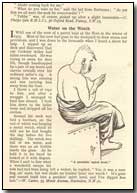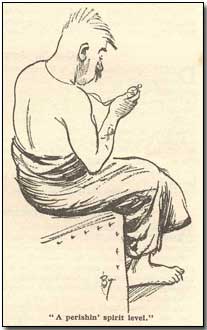Memoirs & Diaries - The Best 500 Cockney War Stories - Water on the Watch and Other Stories
 Published in London
in 1921, The Best 500 Cockney War Stories
comprised, in the words of its newspaper publisher (The London Evening
News) "a remembering and retelling of those war days when laughter
sometimes saved men's reason".
Published in London
in 1921, The Best 500 Cockney War Stories
comprised, in the words of its newspaper publisher (The London Evening
News) "a remembering and retelling of those war days when laughter
sometimes saved men's reason".
The collection of short memoirs, some 500 in total, is divided into five categories - Action, Lull, Hospital, High Seas and Here and There. This page contains five stories from High Seas, led by Water on the Watch.
Other sections within the collection can be accessed using the sidebar to the right.
Water on the Watch
I was one of the crew of a patrol boat at the Nore in the winter of 1915. Most of the crew had gone to the dockyard to draw stores and provisions, and I was down in the forecastle when I heard a shout for help.
I nipped up on deck and discovered that our Cockney stoker had fallen overboard. He was trying to swim for dear life, though handicapped by a pair of sea boots and canvas overalls over his ordinary sailor's rig. A strong tide was running and was carrying him away from the boat.
I threw a coil of rope to him, and after a struggle I managed to haul him aboard. I took him down to the boiler room and stripped off his clothes.
Around his neck was tied a bootlace, on the end of which was hanging a metal watch, which he told me he had bought the day before for five shillings.
The watch was full of sea water, and there was an air bubble inside the glass. As he held it in his hand he looked at it with disgust.
When I said to him what a wonderful escape his wife had had from being left a widow, he replied, "Yes, it was a near fing, ole' mate, but wot abaht me blinkin' bran' noo watch? It's gone and turned itself into a perishin' spirit level, and I've dipped five bob."
W. Carter, 55 Minet Avenue, Harlesden, N.W.10
A Gallant Tar
An awe-inspiring sight met the eyes of the 29th Division as they came into view of Gallipoli on the morning of April 25, 1915. Shells from our ships were bursting all over that rugged coast, and those from the enemy bespattered the water around us.
While I gazed at the scene from the deck of the Andania, carried away by the grandeur of it all, my reverie was broken by a Cockney voice from the sailor in charge of the small boat that was to take us ashore.
"'Op in, mate," said the sailor. "I've just lorst three boats. I reckon I'll soon have to take the blooming island meself."
His fourth trip was successfully accomplished, but the fifth, alas! was fatal both to this gallant tar and to the occupants of his boat.
G. Pull (late 1st R. Innis. Fus.), 20 Friars Place Lane, Acton, W.3
A Cap for Jerry
Dawn, September 1, 1917, H.M. destroyer Rosalind was engaged with enemy ships off Jutland.
I was serving on one of the guns, and we were approaching the enemy at full speed. The ship was vibrating from end to end, and the gun fire, the bursting of shells, and the smell of the cordite had got our nerves at high tension.
When we were very near the enemy one of the German ships blew up completely in a smothering cloud of smoke.
At this time something went wrong with our ammunition supply, and we had used up all that we usually carried on the gun platform.
One of the gun's crew, a Cockney, put his cap in the breech, and said "Quick! Send 'em this to put the lid on that blinkin' chimney."
We all had to laugh, and carried on.
W. E. M. (late H.M.S. Rosalind), 19 Kimberley Road, Leytonstone, E.11
Give 'im 'is Trumpet Back
After the Britannia was torpedoed in November 1918, and the order "Abandon Ship" had been given, the crew had to make their way as best they could to a destroyer which had pulled up alongside.
Hawsers were run from the Britannia to the destroyer, down which we swarmed. Some got across. Others were not so lucky. One of the unlucky ones who had a free bath was a Cockney stoker nicknamed "Shorty," who, after splashing and struggling about, managed to get near the destroyer.
To help him a burly marine dangled a rope and wooden bucket over the side, this being the only means of rescue available. The marine, who was puffing at a large meerschaum pipe, called out: "Here y'are, Shorty, grab 'old o' this bucket an' mind yer don't drown yerself in it."
"Shorty" makes sure of bucket, then wipes the water from his eyes, looks up to the marine, and says: "Garn, give the kid 'is trumpet back."
G. Lowe (ex-R.M.L.I.), 18 Brocas Street, Eton, Bucks
Getting the Range
It was on H.M. monitor General Wolfe, my first ship, and this was my first taste of actual warfare. We were lying anchored off the Belgian coast, shelling an inland objective with our 18-in. gun, the ammunition for which, by the way, was stowed on the upper deck.
All ratings other than this gun's crew were standing by for "action stations." Just then the shore batteries opened fire on us. The first shot fell short, the next went over.
A Cockney member of my gun's crew explained it thus: "That's wot they calls a straddle," he said. "They finds our range that way - one short, one over, and the next 'arf way between. Got a 'bine on yer before it's too late?"
Regd. W. Ayres (late A.B., R.N.), 50 Lewisham High Road, New Cross, S.E.14
Next - Coco-nut Shies and four other stories
"Bellied" was a term used to describe when a tank's underside was caught upon an obstacle such that its tracks were unable to grip the earth.
- Did you know?

